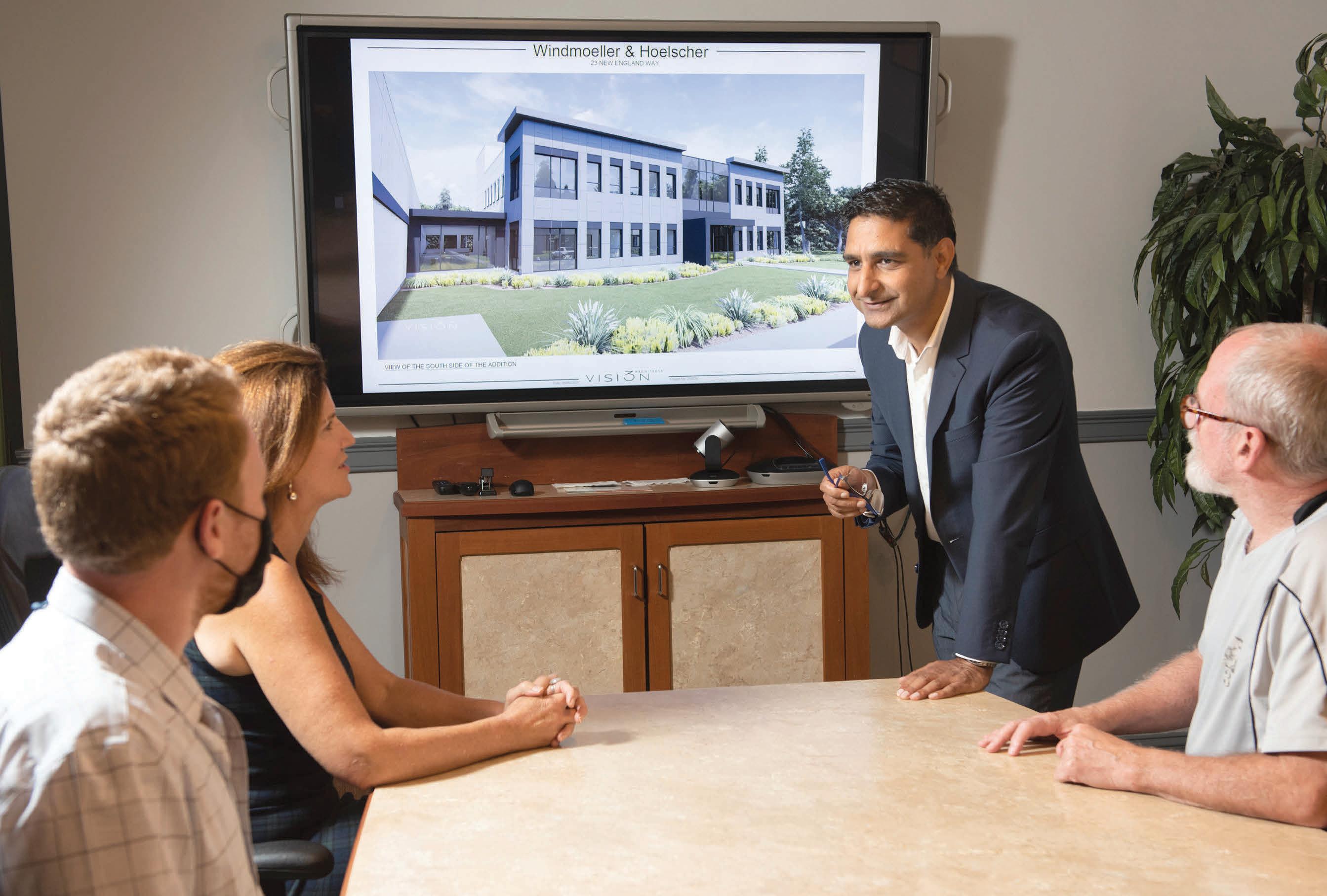
3 minute read
1. Windmoeller & Hoelscher Corp
Keeping package makers moving
BY SUSAN SHALHOUB | Contributing Writer
Advertisement
‘We will …
continue to
SNEAK PEEK: Windmoeller & Hoelscher Corp. Senior Vice President Javeed Buch, standing, meets with staffers at the firm’s North American headquarters in Lincoln. On the screen is an artist’s rendering of the company’s future offices that are soon to be under construction.
PBN PHOTO/DAVE HANSEN
1WINDMOELLER & HOELSCHER CORP. – a German company with offices in Lincoln – manufactures machinery that companies use to produce flexible packaging. This packaging includes plastic film, printing presses, and paper and plastic sack producing lines. Most of its customers produce packaging for food and medical products.
There are several factors that have converged to create growth at Windmoeller over the past few years, says compawhich helps increase Windmoeller’s bottom line. During the COVID-19 pandemic, the ny President Andrew Wheeler. An increase in demand in the flexible-packaging industry is one influence, he said, with the industry growing about 2% a year since it was developed just after World War II. Many Windmoeller customers are upgrading and adding new equipment as a result. At the end of 2019, flexible-packaging sales totaled more than $33 billion, Wheeler said. “To add to that, our headquarters in Germany has an R&D [research and development] department that is constantly working on technologies to improve efficiency, productivity and sustainability during production on our machinery,” Wheeler said. “Some new automation systems can significantly reduce the amount of energy used, as well as scrap accumulated during set up and production,” details that can make a huge difference, he said. Wheeler said the company has introduced a comprehensive data collection, analysis and optimization tool as well, which has been popular. Even outside of increased demand, Wheeler said, customers are periodically replacing old and outdated equipment, company was in an interesting position. While Windmoeller operated during the crisis, its customers’ products were more in demand due to their nature. Most food and medical products are packaged in thin-gauge flexible plastic, Wheeler notes, to extend their shelf life and protect them from contamination and spoiling. “This was particularly important when people were being asked to go to the store just once every few weeks,” he said. Medical supplies and personal protective equipment need to be packaged in plastic to prevent contamination when they are being transported. With this increased demand, there was a heightened importance that customers’ machinery be operational as soon as possible. Windmoeller touts some notable achievements during the COVID-19 pandemic, including completion of all installations on time; successfully strategizing ways to help its customers stay on track with production; and keeping technicians safe and healthy with innovative methods. With communication the tie that binds it all together, about 70% of the Lincoln employees worked remotely during the pandemic, Wheeler said, to reduce the chances of infection.
“We created protocols and workstations at customer plants to eliminate to as great of an extent as possible any interactions,” he said.
This included cordoning off installation areas so that only workers involved with the installation could enter. Mobile offices with built-in workspaces and bathrooms were implemented as well, to reduce potential contamination and keep installation teams at full capacity.
When COVID-19 first started spreading, Wheeler said, Windmoeller began thinking ahead.
“We crunched numbers and ordered much larger quantities of spare parts than we normally would have on hand at any one time. This was to get ahead of any sort of shipping delays,” he said. “We pride ourselves on getting about 70% of spare parts from our Lincoln-based warehouse to our U.S. and Canadian customers right away so they can have them in 24 hours. The ability to do this was absolutely crucial and our plan ended up being a good one.”
The capital equipment business is one in which selling a couple more or less machines than the year before can make all the difference, Wheeler said. Continued growth in flexible packaging means continued industry growth.
Windmoeller is committed to improving technologies that consume as little energy and material as possible.
“We will also continue to collaborate with partners to find ways to improve sustainability and recyclability of pack-
CEO (or equivalent): Andrew Wheeler, president 2020 Revenue: $261.7 million 2018 Revenue: $175.4 million Revenue growth: 49.1% aging,” Wheeler said. n




